Chuck Niles Tribute Page
This page is dedicated to the The King of Jazz Radio, Chuck Niles. June 24, 1927 - March 15, 2004
Chuck Niles was more than L.A.'s leading jazz DJ for more than 40 years -- he was the music's heart and soul.
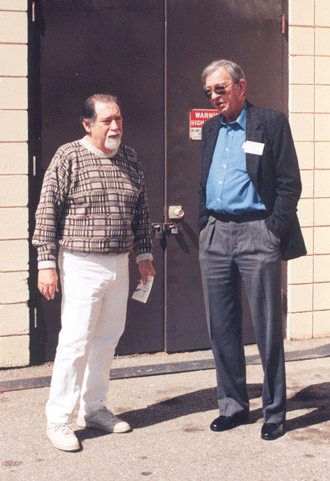
Chuck and Ruben Estrada
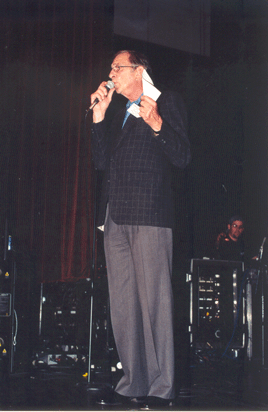
at the Ruben Estrada Medical Benefit - March 21, 1999
Master of Ceremonies
Working the Crowd
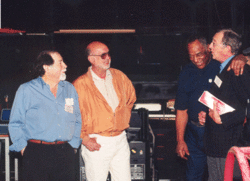
Chuck and some fans
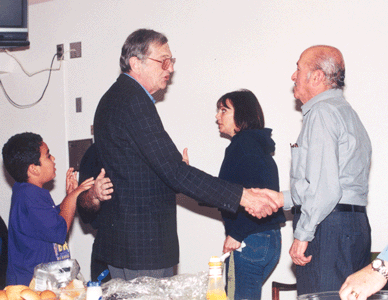
Ruben Estrada, John Slais, Unknown and Chuck
Chuck and more fans
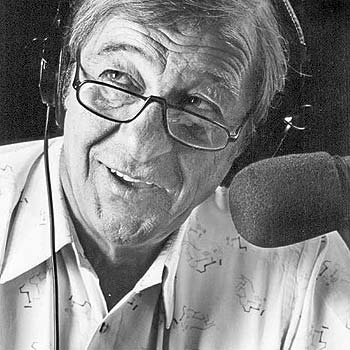
Actually, that's my Dad, Raul Rico Sr. shaking hands with Chuck, my nephew Alex and OJ Prosecutor, Marcia Clark
Chuck Niles -- the voice of Jazz in Los Angeles passed away at the age of 76.
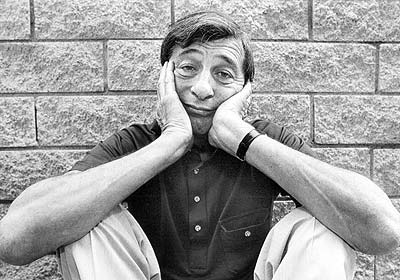
He spent over 50 years on-air and was beloved by all, earning him countless affectionate nicknames-- Bob Florence called him "Bebop Charlie"; the Latin Jazz world knew him as "Carlitos Niles"; and Horace Silver dubbed him the "Hippest Cat in Hollywood."
Worked at KFOX, 1956; KNOB, 1957-65; KBCA, 1965-79; KKGO, 1979-89; KKJZ, 1990; KLON, 1990-2002/KKJZ, 2002-04.
Jazz deejay star's voice falls silent

Niles suffered a stroke Feb. 26 shortly after a doctor's visit and died at Santa Monica Hospital, according to representatives from Long Beach- based KKJZ FM 88.1 "Kjazz.'
Dubbed "Be-Bop Charlie,' "Mr. Jazz' and the "Minister of Cool,' Niles had served as the afternoon drive host on KKJZ since 1990. His life's work earned him a star on the Hollywood Walk of Fame the only one ever awarded to a jazz radio host.
"Chuck Niles was to jazz lovers what Chick Hearn was to Lakers' fans,' said KKJZ station manager Sean Heitkemper. "He was the most talented, knowledgeable and recognizable jazz radio announcer in the nation. And he was also a friend to everyone who worked at and listened to him at the station.'
KKJZ, formerly KLON, will play a regular tribute to Niles for the next several days. Listeners can expect to hear classic interviews, broadcasts and Niles' favorite tunes.
Born Charles Neidel in Springfield, Mass., in 1928, Niles began playing clarinet at age 7 and was playing professional jobs on the saxophone by age 14. His first big break into professional radio was at WEAT in West Palm Beach, Fla.
Shortly thereafter, he headed to California to pursue an acting career and worked at KHJ, Channel 9, in Los Angeles as the afternoon movie host. He also hosted a show where those who had gone on safari and other adventures shared tales of their excursions.
Aspiring to be an actor, the tall and lean Niles played a Frankenstein-like character in the movie, "Teenage Zombies,' and had a small role in "Breakfast at Tiffany's' and other films. Niles also did plenty of stage work, appearing in touring versions of "Death of a Salesman,' "Light Up in the Sky,' and "Dial M for Murder.'
During his time with Channel 9, Niles landed a spot on KFOX where he developed a long-lasting relationship with jazz legend Sleepy Stein, who brought Chuck to KNOB, launching the career of one of the most recognizable voices in Los Angeles radio. His understanding of the history, artists and heritage of jazz made him one of the most well-respected personalities in the Los Angeles jazz community.
After leaving KNOB in 1965, he began a long run at KBCA, which later became KKGO. Niles stayed at KKGO until the station's format changed from jazz and blues to classical. In the switchover, KKGO gave its sizable jazz record collection to KLON, and the station signed Niles.
By the time he arrived at KLON, he was arguably one of the most recognizable personalities in Southern California radio. His employment was a boon to the station and helped cement what would become KJAZZ as one of the nation's most popular jazz and blues stations. "We are alternately the No. 1 or No. 2 station in America, largely because of Chuck,' said KKJZ General Manager Judy Jankowski. "He cannot be replaced, but we can honor his spirit by continuing to bring listeners hosts whose knowledge of jazz borders on scholarship.'
There are more jazz songs written about Niles than any other broadcaster. Among them: "Bebop Charlie' by Bob Florence; "The Hippest Cat in Hollywood' by Horace Silver; "Niles Blues' by Louie Bellson; "Mambo Niles' by Jose Rizo; and "Nilesology' by Bill Cunliffe
The station expects more to be written.
Niles is survived by his wife, Nancy Neidel, and daughter, Tracy Neidel, both of Southern California. Funeral arrangements are pending. Additional information is available on www.kkjz.org
Chuck Niles, 76; Voice of L.A.'s Jazz Radio
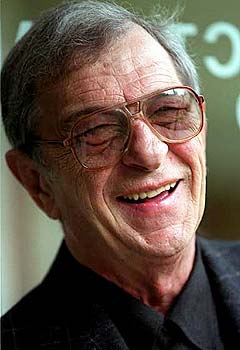
Chuck Niles was the voice of jazz radio in Southern California for more than 40 years and, some might say, its heart and soul.
Niles, 76, died Monday night at Santa Monica's UCLA Medical Center of complications from a stroke. He had been on the air until Feb. 25, the day before he suffered the stroke, said Judy Jankowski, president and general manager of KKJZ-FM (88.1), the station where Niles had worked since 1990. He had undergone quintuple bypass surgery in July 2001.
Jankowski said that Niles' importance to the station and jazz in Southern California was immeasurable.
"He lived and breathed jazz and was a living jazz historian," she said Tuesday.
"Chuck had the perfect deejay's attributes, a marvelously mellifluous voice, a great sense of pacing and an innate, cool dude manner," said jazz critic Don Heckman. "But what really made him special was his knowledge and respect for the music, his capacity to present it with the sort of rich communicative understanding that could only have come from someone who, like Chuck, was a musician himself."
Niles spun tracks on a succession of jazz radio stations, beginning with the pioneering jazz station KNOB in Los Angeles and ending on KKJZ-FM in Long Beach. More than an announcer, he was a one-man jazz university, introducing the music and its lore to generations of Southern Californians. He also served as an unofficial jazz ambassador, emceeing countless concerts, memorials and other jazz related events.
A former colleague, Ken Borgers, once called him "the Vin Scully, the Chick Hearn of jazz."
A musician by training, Niles counted many of the jazz greats among his friends, and was the inspiration for several songs, including "Niles Blues" by Louie Bellson and "Be Bop Charlie" by Bob Florence. That song memorialized one of his several nicknames; he also was known as Carlito Niles when playing Latin jazz and Country Charlie Niles during a brief, unhappy stint on a country music station.
Few people had less country in them than Chuck Niles.
One of the few septuagenarians who could refer to someone as a "cat" without sounding foolish, Niles had a voice that seemed perfectly suited to jazz: a deep, smooth, lilting baritone burnished by a life of cigarette smoking and deployed as a virtual musical instrument. He brought an extraordinary depth of knowledge to his radio broadcasts, which he sprinkled with telling anecdotes, heartfelt tributes and lots of exclamations of "Oh, man!"
He could be found many nights at one or more of his favorite jazz nightclubs, soaking up the music and hobnobbing with friends, and his frequent on-air plugs were credited with helping to keep the Southern California jazz club scene alive. Aside from music, his principal passion in life was acting, and his biggest regret was not having achieved greater success on stage or screen. He appeared in many local theatrical productions in the 1950s and '60s, and had a bit part in "Teenage Zombies," which was released in 1958 and eventually won cult status as one of the worst movies ever made.
"I was just walking around like Frankenstein, that's all, no lines, just 'gluergugluergu,' and I'm pretty good at that," he recalled in an interview in 2001. The movie, he cheerfully conceded, "was just terrible."
Niles was proud to have been awarded a star on the Hollywood Walk of Fame, although he might have preferred that it be adorned with a camera, not a microphone. Still, he took a journeyman's joy in his radio work and resented anyone who suggested that it was a fallback career.
"My line is, 'All I need is my big fat mouth and a microphone,' " he said. "And in addition to that, my line is, 'And there's no heavy lifting.' And so when I say I go to work, that's work? I buy the best earphones, I'm down there . . . I'm enjoying myself! How lucky can you get? I'm not saying I didn't play the blues, because I have played some blues, but I'm still a very fortunate cat."
Born Charles Neidel in Springfield, Mass., on June 24, 1927, he eventually adopted the name Niles because he got sick of people calling him "needle," rather than correctly pronouncing his name to rhyme with "idle." He kept Neidel as his legal name.
Theater and music were part of his life from his earliest years. His father, a paper salesman, was an amateur actor in local productions. Niles took up clarinet at an early age and played his first paying gig on saxophone at age 15 in a brothel.
"As things went on and on, I started playing more often," he recalled. "I tell you, I was never out of work."
In 1945, with World War II nearly over, Niles enlisted in the Navy. The war ended while he was still in basic training in Florida. Niles was sent to San Diego and briefly stationed in the South Pacific.
Though largely uneventful, his stint in the military produced some indelible memories. Years later, Niles would recall hitchhiking from San Diego to Hollywood to catch a concert at the Hollywood Palladium, and searching the radio dial for the first sounds of jazz as his ship approached New York Harbor at the end of his service. He even remembered the song that was playing: "Symphony," by Benny Goodman and His Orchestra.
After the Navy, Niles returned to music full time, playing alto sax in a jazz band, the Emanon Quartet, "no name" spelled backward. "How hip can you get?" he later mused.
They were hip, in Niles' recounting. They wore the hippest clothes: white shirts, pegged pants, blue suede shoes and blue cardigans. They played the hippest music: bebop, which was then revolutionizing the jazz world. Jazz styles would come and go over the next half century, but Niles stayed forever true to the straight-ahead jazz of his youth.
Back in Springfield, Niles earned a bachelor's degree in sociology from American International University and, in 1951, landed a job playing music on a local radio station, WTXL. By 1953, growing bored, he drove to Los Angeles. Failing to find work, he drove on to West Palm Beach, Fla., where he quickly found a job on radio station WMVD. He stayed there a year, then did a stint as a television sportscaster and dance show host before another bout of restlessness sent him back to California.
It was 1956. This time, he would stay.
His first job was on KFOX radio, playing rock 'n' roll tinged pop that wasn't exactly his style. Next came KHJ-TV Channel 9, where he hosted afternoon movies and the "Strange Lands and Seven Seas" program, "You know . . . some guy goes to Africa, films a herd of elephants, comes back and tells me about it."
But his real break came in 1957, when Sleepy Stein recruited him to be an announcer on what claimed to be the first all-jazz radio station in the United States: KNOB, "the jazz knob." (Jazz historian Dan Morgenstern, head of the Institute of Jazz Studies at Rutgers University, said the claim is probably true, but difficult to verify.)
Niles stayed there eight years, honing his craft and creating a close bond with the Southern California jazz community.
In the meantime, he was pursuing acting jobs and hanging out at the Masquer's Club, a theatrical club in Hollywood where, he said, he spent "the happiest times of my life."
Niles landed roles in regional theatrical productions of "Harvey" and "Dial M for Murder," among others, and played Biff in a summer stock production of "Death of a Salesman."
He married in 1964, and though he and his wife, Nancy Neidel, eventually separated, they never divorced and remained on friendly terms. Daughter Tracy Neidel inherited her father's love of music, becoming a pop and blues singer who uses the stage name Tracy Niles.
In 1965, Niles left KNOB for KBCA, another all-jazz station that changed its call letters to KKGO in 1979. KKGO switched to classical music in 1990, and Niles left immediately for KLON-FM, the station of Cal State Long Beach, which had an all-jazz format.
The station changed its name to KKJZ in August 2002.
There, Niles continued to play the music that he loved, introducing Charlie Parker, Dizzy Gillespie, Dexter Gordon, Horace Silver, Count Basie, Ella Fitzgerald, Lionel Hampton and hundreds of other jazz luminaries to yet another generation.
A public memorial service for Niles will be held at 10:30 a.m. Saturday at Church of the Hills, Forest Lawn Hollywood, 6300 Forest Lawn Drive
Jazz has lost its voice
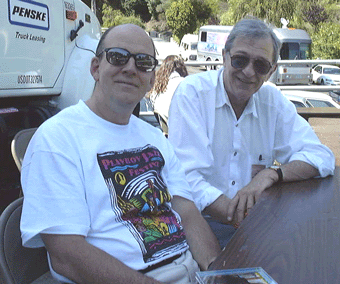
AN APPRECIATION
One would be hard-pressed to find a hipper night school than Chuck Niles' drive-time lessons in jazz. With his passing Monday night at the age of 76, Southern California has sadly lost its premier master class and its peerless professor.
The voice of jazz on L.A. radio airwaves for more than 40 years, "Bebop Charlie" was more than an announcer or DJ; he was a time capsule, our well-thumbed encyclopedia. Mostly, though, he was the A-list insider with the passkey into the vibrant world of straight-ahead jazz.
Niles lived a 24-hour jazz life. You could hear it in his late-night basement baritone; see it in his tireless crosstown club-crawling. You always knew you were at the spot if you'd swivel around and catch Niles, all 6 feet 4 of him, slipping onto a barstool to check out the tail end of a late set, doing what he did best: circulating.
From sound booths at KNOB in the late '50s, then KBCA (later KKGO) and KLON, now KKJZ, Niles tutored hundreds of thousands of listeners on the finer points of classic jazz. To be sure, he had areas of interest: bebop, Ellington, Sarah Vaughan, Phil Woods. Sometimes his leanings would show, and he'd try his best to catch himself, mid-set, to "ease off the Sass and Duke."
"He really did a job here," says saxophonist/clarinetist Buddy Collette, who shared many a stage with Niles over the space of 30-plus years. Both were engaged in what many outsiders thought was an oxymoronic practice, promoting jazz in Los Angeles. "He got inside it because he really understood the beats and pace of the city," Collette says.
Niles got inside the music, and in turn the music got inside the heads of so many Angelenos. "The reason that he was able to open people up to jazz so readily was the way he talked about it," says Jazz Bakery proprietor Ruth Price. "It was, 'This cat can really blow!' When Chuck talked about it, anyone could understand it."
Indeed, no one on local radio spoke like Chuck Niles. That Pall Mall-grooved voice, that vintage "platter patter," was as distinctive as an instrument. That purring "yeaaahhhh" at cut's end was recognizable in an instant.
Growing up in L.A., I can't remember a moment when Chuck Niles wasn't somewhere on the dial. My jazz education started with Niles at KBCA, his after-hours voice diagraming the West Coast sound, working through the formulas of Latin jazz, tracing the bebop family tree: bop, hard bop, post-bop and beyond. It always sounded like he was knocking around alone in a room in a place where it was always nighttime.
"He had this way of talking about each individual player in a session," KKJZ DJ Helen Borgers says. "He would back-announce a tune, quickly and concisely, giving details about that particular session, all the sidemen, a particular musician, 'That's a really good little timekeeper from Philadelphia.' ... It was inclusive, not exclusive."
His show was always a bit improvised, like the music itself. A Chuck Niles set was as much about connections as it was moods, digressions about the weather or his need to pick out a long-enough cut so he could grab a cigarette.
L.A.'s jazz scene had every reason to think that Niles would always be there because he always was: at this ribbon-cutting or cocktail party; at this banquet in schools.
"People would say, well, Chuck has to be there. He makes it special," Collette says. "So he had to go. Even if he was tired, he'd go." Retirement was never a question: "You always got the feeling he was just going to hang until the time ran out."
That constant presence spoke volumes. "He was always there for us," says guitarist and educator Kenny Burrell. "I was there when they gave him his star on the Walk of Fame. And I don't know if it says 'the Dean of Jazz.' But if it doesn't, it should"
As radio becomes more bland and standardized coast-to-coast, our ears have become less used to radio that reflects a region or encourages personality. Given that, I can't imagine what my understanding of jazz would be without Niles' idiosyncratic influence, his meanderings down memory lane, his trotting out one-of-a kind morsels about Dexter Gordon, Carmen McRae or Poncho Sanchez, making the history of jazz come alive, indelible before our ears.
While we ponder the plight of jazz studies, we might as well add the question: What will become of our jazz IQ without Chuck Niles?
By Lynell George, L.A. Times Staff Writer - March 19, 2004
Ken Borgers & Chuck at the Playboy Jazz Festival
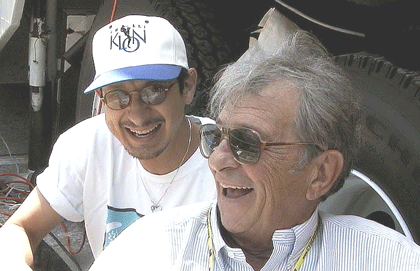
Chuck & Alfredo Cruz
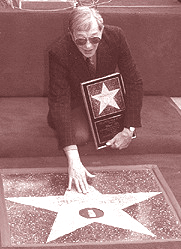
Hollywood Walk of Fame
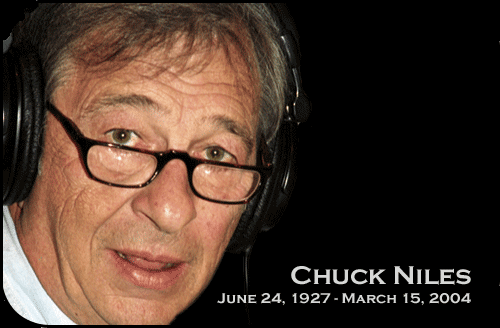
He remains the only Jazz Disc Jockey with a star on the Hollywood Walk of Fame.
Straight Ahead!
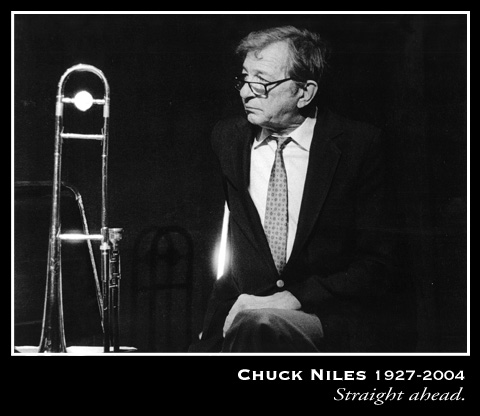
Jazz Legend Chuck Niles Gone
His smooth voice and extensive knowledge of jazz music kept him on the air for more than 50 years, but radio host Chuck Niles is now heard only on KKJZ in tribute. Niles died Monday of complications from a stroke. He was 76.
Niles, who had occupied the afternoon drivetime slot on KKJZ (Kjazz 88.1 FM) since 1990, suffered a stroke Feb. 26, shortly after a visit to the doctor's office. He eventually lost consciousness, which he never regained.
KKJZ Station Manager Sean Heitkemper said, "Chuck Niles was to jazz lovers what Chick Hearn was to Lakers' fans. He was the most talented, knowledgeable and recognizable jazz radio announcer in the nation."
Born Charles Neidel in Springfield, Mass., in 1928, Niles began playing the saxophone professionally at 14 years old. He first broke into radio at WEAT in West Palm Beach, Fla. An aspiring actor, Niles moved to Los Angeles, where he worked at KHJ, Channel 9, as the afternoon movie host. He had film roles in "Teenage Zombies" and "Breakfast at Tiffany's", and appeared on stage in "Death of a Salesman" and "Dial M for Murder" among others.
Niles began broadcasting in Los Angeles on KFOX, where he developed a lasting relationship with jazz legend Sleepy Stein. When Stein started KNOB, the first jazz station on the West Coast, he signed Niles, who became arguably one of the most recognized voices on Southern California radio - he is the only jazz disc jockey to have a star on the Hollywood Walk of Fame.
After leaving KNOB in 1965, Niles went to KBCA (later KKGO), where he stayed until the format changed from jazz and blues to classical. He then signed with KKJZ (then KLON) in 1990.
His impressive resume aside, Niles was known for the relationships he built with his colleagues and musicians.
"He meant everything to the station," KKJZ General Manager Judy Jankowski said.
Payal Kumar, operations director and host of Soul Jazz on the station, said she first met Niles five years ago, when she was an intern.
"I was scared to death of him," she recalled. "He was a legend."
Her nerves were soon put to rest when he broke the ice. The two subsequently worked together on station projects, Kumar said.
"He was just the epitome of cool," Kumar said. "They don't make them like Chuck anymore."
Since Monday, Jankowski said the station has heard from WBGO, a jazz station in New Jersey with whom KKJZ has a relationship, as well as several musicians.
There are more jazz songs written about Niles than any other broadcaster, including "Bebop Charlie" by Bob Florence; "The Hippest Cat in Hollywood" by Horace Silver; "Niles Blues" by Louie Bellson; "Mambo Niles" by Jose Rizo; and "Nilesology" by Bill Cunliffe.
KKJZ will continue for the next several days to pay tribute to Niles with classic interviews, broadcasts and his favorite music.
Niles is survived by his wife, Nancy Neidel, and daughter Tracy, both of Southern California.
A memorial service is planned for 10:30 a.m. Saturday in Forest Lawn's Church of the Hills at Forest Lawn Hollywood, 6300 Forest Lawn Drive, Los Angeles. Fans are welcome.
In lieu of flowers, donations can be made to the Chuck Niles Foundation, c/o KKJZ FM, 1288 N. Bellflower Blvd., Long Beach 90815.
By Jenny Lee Rice, Staff Writer - gazettes.com